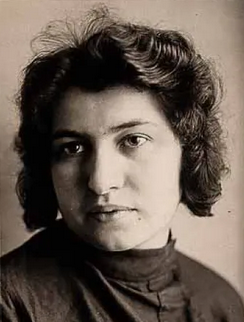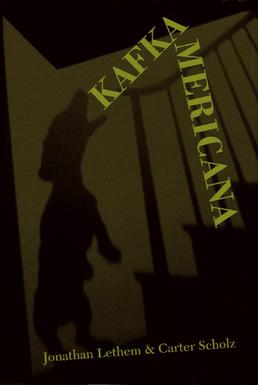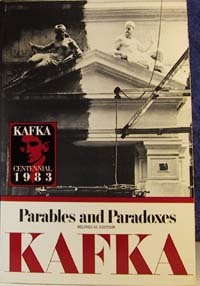Related Research Articles

Franz Kafka was a German-speaking Bohemian novelist and short-story writer based in Prague, widely regarded as one of the major figures of 20th-century literature. His work fuses elements of realism and the fantastic. It typically features isolated protagonists facing bizarre or surrealistic predicaments and incomprehensible socio-bureaucratic powers. It has been interpreted as exploring themes of alienation, existential anxiety, guilt, and absurdity. His best known works include the short story "The Metamorphosis" and novels The Trial and The Castle. The term Kafkaesque has entered English to describe absurd situations, like those depicted in his writing.

The Trial is a novel written by Franz Kafka in 1914 and 1915 and published posthumously on 26 April 1925. One of his best known works, it tells the story of Josef K., a man arrested and prosecuted by a remote, inaccessible authority, with the nature of his crime revealed neither to him nor to the reader. Heavily influenced by Dostoevsky's Crime and Punishment and The Brothers Karamazov, Kafka even went so far as to call Dostoevsky a blood relative. Like Kafka's two other novels, The Castle and Amerika, The Trial was never completed, although it does include a chapter which appears to bring the story to an intentionally abrupt ending.

"In the Penal Colony" is a short story by Franz Kafka written in German in October 1914, revised in November 1918, and first published in October 1919. As in some of Kafka's other writings, the narrator in this story seems detached from, or perhaps numbed by, events that one would normally expect to be registered with horror. Internal clues and the setting on an island suggest Octave Mirbeau's The Torture Garden as an influence. The story is set in an unnamed penal colony and describes the last use of an elaborate torture and execution device that carves the sentence of the condemned prisoner on his skin as he slowly dies over the course of twelve hours. As the plot unfolds, the reader learns more and more about the machine, including its origin and original justification.

Dora Diamant is best remembered as the lover of the writer Franz Kafka and the person who kept some of his last writings in her possession until they were confiscated by the Gestapo in 1933. This retention was against the wishes of Kafka, who had requested shortly before his death that they be destroyed.
"The Burrow" is an unfinished short story by Franz Kafka written six months before his death. In the story a badger-like creature struggles to secure the labyrinthine burrow he has excavated as a home. The story was published posthumously in Beim Bau der Chinesischen Mauer by Max Brod, Kafka's friend and literary executor. The first English translation, by Willa and Edwin Muir, was published by Martin Secker in London in 1933. It appeared in The Great Wall of China. Stories and Reflections.

“A Country Doctor” is a short story written in 1917 by Franz Kafka. It was first published in the collection of short stories of the same title. In the story, a country doctor makes an emergency visit to a sick patient on a winter night. The doctor faces absurd, surreal predicaments that pull him along and finally doom him.

The Blue Notebooks is the second album by British producer and composer Max Richter, released on 26 February 2004 on 130701, an imprint of FatCat Records.

The Complete Stories of Franz Kafka is a compilation of all of Kafka's short stories. With the exception of three novels, this collection includes all of his narrative work. The book was originally edited by Nahum N. Glatzer and published by Schocken Books in 1971. It was reprinted in 1995 with an introduction by John Updike.
The Blue Octavo Notebooks is a series of eight notebooks written by Franz Kafka from late 1917 until June 1919. The name was given to them by Max Brod, Kafka's literary executor, to differentiate them from the regular quarto-sized notebooks Kafka used as diaries. Along with the octavo notebooks, Brod also found a series of extracts copied out and numbered by Kafka. Brod named this brief selection "Reflections on Sin, Suffering, Hope, and the True Way" and included it in The Great Wall of China.

Kafka Americana is a 1999 collection of short stories by Jonathan Lethem and Carter Scholz based on the life and works of Franz Kafka. Originally published in a limited edition by Subterranean Press, it was released as a trade paperback by W. W. Norton & Company in 2001.

Parables and Paradoxes is a bilingual edition of selected writings by Franz Kafka edited by Nahum N. Glatzer. In this volume of collected pieces, Kafka re-examines and rewrites some basic mythical tales of the Israelites, Ancient Greeks, Far East, and the Western World, as well as creations of his own imagination.

Dearest Father. Stories and Other Writings is a collection of writings by Franz Kafka translated by Ernst Kaiser and Eithne Wilkins with notes by Max Brod. The title derives from Kafka's Letter to His Father, which begins with this salutation.
"The Vulture" is a short story by Franz Kafka, written sometime between 1917 and 1923.

Franz Blei was an essayist, playwright and translator. He was also noted as a bibliophile, a critic, an editor in chief and publisher. He was a friend and collaborator of Franz Kafka.
"Jackals and Arabs" is a short story by Franz Kafka, written and published in 1917. The story was first published by Martin Buber in the German monthly Der Jude. It appeared again in the collection Ein Landarzt in 1919.
The Kafka Project is a non-profit literary research initiative founded in 1998 at San Diego State University. Working on behalf of the Kafka estate in London, England, the SDSU Kafka Project is working to recover materials written by Franz Kafka, the widely acclaimed modernist author, stolen by the Gestapo in 1933. The search continues in Eastern Europe and Israel.
"The Knock at the Manor Gate" is a short story by Franz Kafka. It was published posthumously in Beim Bau der Chinesischen Mauer. The first English translation by Willa and Edwin Muir was published by Martin Secker in London in 1933. It appeared in The Great Wall of China. Stories and Reflections.
"On Parables" is a short story fragment by Franz Kafka. It was not published until 1931, seven years after his death. Max Brod selected stories and published them in the collection Beim Bau der Chinesischen Mauer. The first English translation by Willa and Edwin Muir was published by Martin Secker in London in 1933. It appeared in The Great Wall of China. Stories and Reflections.
"The Truth about Sancho Panza" is a short story by Franz Kafka. It was published in 1931, seven years after the death of Kafka. Max Brod selected stories and published them in the collection Beim Bau der Chinesischen Mauer. The first English translation by Willa and Edwin Muir was published by Martin Secker in London in 1933. It appeared in The Great Wall of China: Stories and Reflections.
"Shamefaced Lanky and Impure in Heart" is the name usually given to Franz Kafka's earliest surviving work of fiction, a short story that he wrote in 1902 and that has survived only because it was included in a letter to his friend Oskar Pollak.